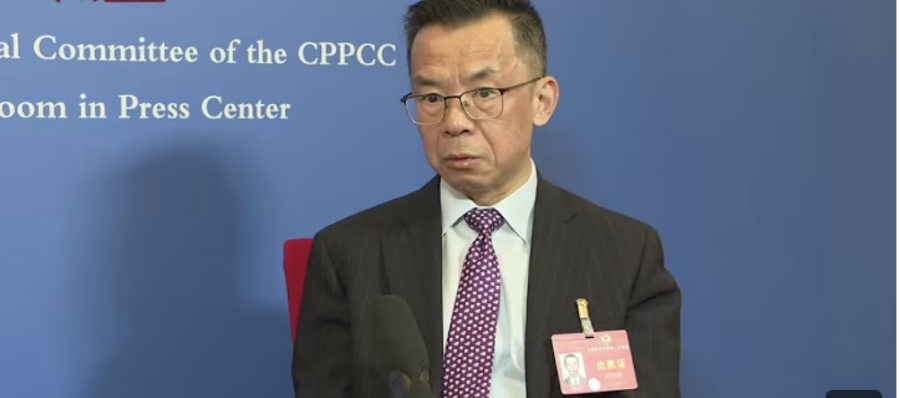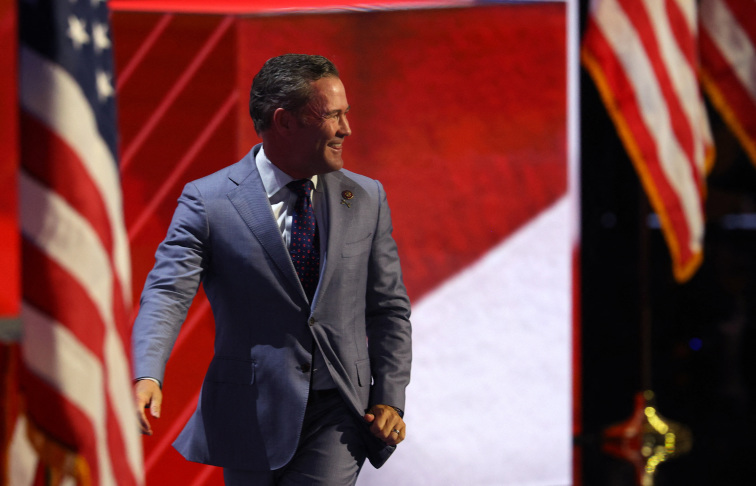Lu Shaye, the "Wolf Warrior and Rude Ambassador" of the Chinese Communist Party (CCP) to France. (screenshot)
[People News] After a year of speculation about the departure of Lu Shaye, the CCP’s “Wolf Warrior and Rude Ambassador” to France, the rumors have finally been confirmed. On December 9, the Chinese Embassy in France held a farewell reception for Lu Shaye. On the same day, the embassy's website also published an interview with Lu conducted by China News Service.
In the interview, Lu reiterated his combative stance, insisting that the French and Europeans need to abandon their "condescending attitude" toward China. His parting remarks unmistakably echoed the CCP’s official stance: that the various pressures from Western nations are a reflection of their fear of China's challenge to the West's dominance. However, Lu seemed entirely oblivious to his own shortcomings, a mindset shared by many CCP officials.
In reality, one of the biggest mistakes made by CCP officials like Lu is their persistent failure to distinguish between "China, the Chinese people," and "the CCP." The CCP is merely a “specter from the West” that has entrenched itself on Chinese soil for a few decades, with the sole purpose of wreaking havoc on China, harming the Chinese people, and causing chaos worldwide. The CCP's more than seventy years of rule since its usurpation of power have thoroughly proven its malevolence.
Thus, Western governments and citizens, including those in the United States, are not afraid of China’s development. The immense investments that Western nations made in China during its three decades of reform and opening up are irrefutable evidence of this. However, after decades of engagement, Western nations came to realize that economic development had failed to promote democracy in China. They also recognized that the CCP, which refuses to embrace universal values and denies freedom and autonomy to Chinese citizens who also cherish liberty, is becoming a major threat to the world. Upon understanding that they had nurtured a monstrous force endangering global stability, Western nations decisively acted to curb the CCP.
The actions of the United States and its allies are, in essence, a genuine effort to save the world and assist the Chinese people in resisting the CCP. Meanwhile, CCP officials like Lu Shaye, brainwashed by years of CCP propaganda, fail to grasp this reality and remain ensnared by the Party. Tragically, they may even end up as sacrificial pawns of the CCP, making their situation all the more pitiable.
Why Did the CCP Recall Lu Shaye? Typically, Chinese ambassadors serve terms of two to four years, which can be extended—such as the case of the former Chinese ambassador to the UK, whose term lasted 11 years. However, Lu Shaye, who began his tenure as ambassador to France in 2019, was recalled after just over one term, without completing a second. This deliberate recall likely stems from the negative impact his inflammatory rhetoric had on the CCP's image. Lu is one of the prominent figures representing the CCP’s "Wolf Warrior diplomacy."
On August 11, 2022, the American media outlet Politico published an article introducing five "Wolf Warrior" diplomats stationed in Europe, in which Lu was rated a "five-star wolf warrior." His aggressive demeanor once earned him the favor of the top CCP leadership, who championed this combative diplomatic style. Previously, as the Chinese ambassador to Canada, Lu repeatedly criticized the West during interviews following the arrest of Huawei executive Meng Wanzhou, gaining recognition from the CCP for his remarks.
Examples of Lu Shaye’s "Wolf Warrior" Behavior in France. Lu Shaye’s controversial actions in France include: publicly criticizing French scholar Antoine Bondaz, known for his critical stance toward the CCP, by calling him a "little thug" and an "ideological demon"; claiming in a French TV interview that former Soviet states, including Ukraine, "had no effective status under international law" and that Crimea "was originally Russian"; describing Mao Zedong’s killings as mere "gossip"; criticizing Western countries’ responses to the COVID-19 pandemic and insulting French healthcare workers during the crisis; hurling abuses at French media; and labeling critics of China as "mad dogs disguised as researchers and journalists who are frantically attacking China." These statements resulted in the French foreign ministry summoning him for explanations.
In many instances, Lu could have used diplomatic language to deflect criticism, but he chose instead to double down on his aggressive "Wolf Warrior" persona, showing little regard for professional diplomatic norms. This raises intriguing questions. One possibility is that Lu was pandering to the preferences of the CCP's top leadership, hoping to gain political favor. Another is that Beijing directed him to take this approach as a trial balloon, though the consequences turned out to be severe.
Almost every one of Lu’s remarks caused a significant uproar. On several occasions, European media widely criticized the "rude" ambassador's inappropriate comments. Government officials and politicians from multiple European countries also voiced their disapproval, with some summoning Chinese diplomats to express their dissatisfaction. There were even calls in Europe to expel Lu Shaye. However, for the French government, which had secured lucrative contracts with China, expelling the Chinese ambassador would have embarrassed Beijing and strained bilateral relations. As a result, Lu was not expelled.
Beijing likely refrained from recalling Lu sooner for two main reasons: Avoiding the appearance of yielding to Western pressure, which could harm the CCP's reputation. Preventing disillusionment among "Wolf Warrior" diplomats following directives from the top leadership, as such a move might discourage loyalty and boldness among those working closely for Xi Jinping.
Since the CCP's Third Plenum in July, there has been a noticeable softening of its diplomatic tone. The previous "Wolf Warrior" style has largely disappeared from Xi Jinping’s speeches, statements by foreign ministry spokespersons, CCP media outlets, and the rhetoric of CCP diplomats. This shift likely reflects Xi's waning power within the military and Party. Consequently, prominent figures like Lu Shaye, who no longer align with the CCP’s new diplomatic style, have been discarded like used rags.
Lu is expected to be replaced by Deng Li, the current vice minister of foreign affairs. Deng has previously served as minister-counselor at the Chinese Embassy in France, ambassador to Turkey, and assistant foreign minister. He is fluent in French and attended a reception at the French Embassy in Beijing in January 2023 to mark the 60th anniversary of China-France diplomatic relations. Deng’s remarks during the event were measured and free of provocative language. The CCP’s decision to appoint a diplomat with a more moderate tone to France is likely an attempt to repair its international image. However, without significant policy changes, the CCP’s efforts in the diplomatic arena may yield limited results.











News magazine bootstrap themes!
I like this themes, fast loading and look profesional
Thank you Carlos!
You're welcome!
Please support me with give positive rating!
Yes Sure!